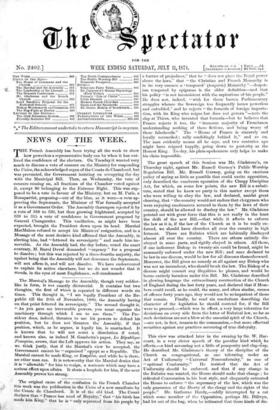The Marshal's Message to the Assembly, though very soldier- like
in form, is not exactly dictatorial. It contains but two thoughts, the first of Which is repeated in different words six -times. This thought is, "I am legally President of the Re- public till the 20th of November, 1880, the Assembly having on that point fettered its sovereignty." The second thought is, " As you gave me irrevocable powers, you must organise the machinery through which I am to use them." The Pre- sident does, indeed, threaten to use his powers to defend his position, but he does not `threaten the Assembly, if that position, which, as he argues, is legally his, is unattacked. It is known that he will not resist a dissolution if voted, and known also, as indeed M. Gambetta's paper, La Republique Frangaise, avows, that the Left approve his action. They say, as we think justly, that if the Marshal's view be accepted, the Government cannot be " organised " eticept as a Republic. The Marshal cannot be made King, or EnspVor, and while he is there, no other man can. It is noteworthy that the Marshal denies that it is " allowable " for him to resign, a sentence which may have a serious effect upon affairs. It shuts a loophole for him, if the next Assembly proves loo strong.


































